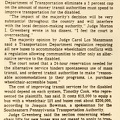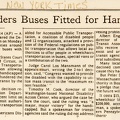Austin American-Statesman ~ Tuesday, February 14, 1989
[Headline] Court mandates Wheelchair access on nation’s buses
PHILADELPHIA (AP) - A federal appeals court Monday ordered the U.S. Department of Transportation to require transit authorities nationwide to equip new buses with wheelchair lifts.
Attorneys who brought the lawsuit called the ruling the most important decision ever handed down for disabled people needing public transportation.
The 3rd U.S. Circuit Court of Appeals said a Transportation Department regulation requiring all new buses to accommodate wheelchairs conflicts with another allowing communities to offer only an alternative service, such as special vans, to the handicapped.
The court said a rule requiring reservations 24 hours in advance for use of the alternative transportation hinders the spontaneous use of mass transit by the handicapped. As a result, the court ordered transit authorities to make “reasonable accommodations to their programs, i.e. purchase wheelchair-accessible buses.”
The court also upheld a controversial decision requiring the Transportation Department to eliminate a cap on the amount of money transit authorities must spend on making transportation accessible.
In Austin, Anthony Kouneski, general manager of Capital Metro, said-Monday's decision “will not significantly affect our service.”
Kouneski said more than 50 percent of Capital Metro's buses already are equipped with wheelchair lifts, and that 80 vehicles on order also will be equipped with lifts. He said Capital Metro also operates Special Transit Service vans for people whose disabilities prevent the use of conventional wheelchair lifts.
A coalition of "disabled people and 12 organizations called Americans Disabled for Accessible Public Transportation filed the lawsuit last year. ADAPT contended that a provision of the federal regulations allowed authorities receiving federal transportation funds to exclude the disabled from “effective and meaningful" access.
The provision allows transit authorities to decide among three types of transportation: accessible buses, special vans for the handicapped, or a combination of the two.
US District Judge Marvin Katz overturned the provision in cases where the transit authority buys any buses. He also overturned a regulation requiring authorities to spend no more than 3 percent of their average annual operating costs on transportation for the disabled.
Katz called the limit arbitrary.
Timothy Gold [sic, really Timothy Cook], who argued the case before the court, said the ruling was “a major, major victory for the handicapped community.”
He said he hoped the ruling would not be appealed.
- Created on
- Friday 12 July 2013
- Posted on
- Wednesday 22 July 2015
- Tags
- 24 hour advanced reservation, 3% cap, 3rd US Circuit Court of Appeals, Austin, buses, Capital Metro, DOT, Tim Cook, wheelchair lifts
- Albums
- Visits
- 2861
- Rating score
- no rate
- Rate this photo


0 comments